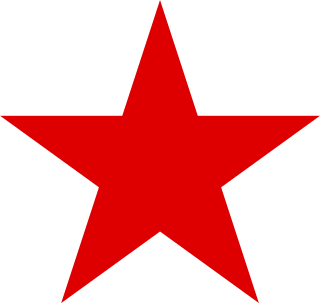
The Socialist Party of Indonesia was a political party in Indonesia from 1948 until 1960, when it was banned by President Sukarno.
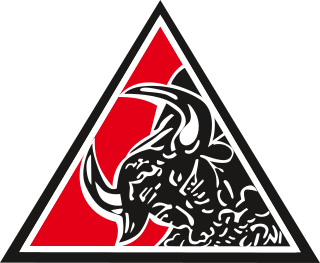
The Indonesian National Party was the name used by several nationalist political parties in Indonesia from 1927 until 1973. The first PNI was established by future President Sukarno. After independence, the new PNI supplied a number of prime ministers, and participated in the majority of cabinets in the 1950s and 1960s. The party was fused into the Indonesian Democratic Party in 1973. In the years following the reforms of the late 1990s, a number of parties claiming to be the continuation of previous PNIs stood in elections, but gained only a handful of seats.
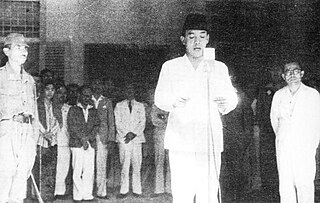
The Proclamation of Indonesian Independence was read at 10:00 Tokyo Standard Time on Friday, 17 August 1945 in Jakarta. The declaration marked the start of the diplomatic and armed resistance of the Indonesian National Revolution, fighting against the forces of the Netherlands and pro-Dutch civilians, until the latter officially acknowledged Indonesia's independence in 1949. The document was signed by Sukarno and Mohammad Hatta, who were appointed president and vice-president respectively the following day.

The Council of Indonesian Muslim Associations Party, better known as the Masyumi Party, was a major Islamic political party in Indonesia during the Liberal Democracy Era in Indonesia. It was banned in 1960 by President Sukarno for supporting the PRRI rebellion.

The Liberal Democracy period in Indonesia, also known as the Era of Parliamentary Democracy, was a period in Indonesian political history, when the country was under a liberal democratic system. During this period, Indonesia held its first and only free and fair legislative election until 1999, but also saw continual political instability. The period began on 17 August 1950 following the dissolution of the federal United States of Indonesia, less than a year after its formation, and ended with the imposition of martial law and President Sukarno's decree, which resulted in the introduction of the Guided Democracy period on 5 July 1959.

Legislative elections were held in Indonesia on 29 September 1955 to elect the 257 members of the House of Representatives. The election was the first national election held since the end of the Indonesian National Revolution, and saw over 37 million valid votes cast in over 93 thousand polling locations. The result of the election was inconclusive, as no party was given a clear mandate. The legislature which was elected through the election would eventually be dissolved by President Sukarno in 1959, through Presidential Decree number 150.

Burhanuddin Harahap was an Indonesian politician and lawyer who served as prime minister of Indonesia from August 1955 until March 1956. He was a member of the Masyumi Party and served as Minister of Defense concurrently with his tenure as prime minister. Afterward, he took part in the unsuccessful Revolutionary Government of the Republic of Indonesia (PRRI) rebellion in West Sumatra.

Soekiman Wirjosandjojo was an Indonesian politician and physician who served as prime minister of Indonesia from 1951 until 1952. Additionally, Soekiman served as the first president of the Masyumi Party from 1945 to 1951.

Indonesian Islamic Union Party was an Islamic political party in Indonesia before and after independence. In 1973 it was merged into the United Development Party.
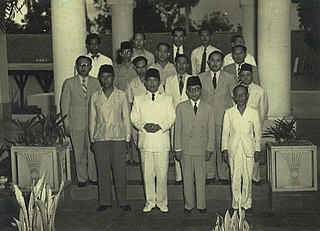
The Soekiman Cabinet, also known as the Sukiman-Suwirjo Cabinet, was an Indonesian cabinet that served from 27 April 1951 until it fell on 23 February 1952 following revelations that it had signed a mutual security agreement with the United States, and was dissolved on 3 April 1952.

The First Ali Sastroamidjojo Cabinet was an Indonesian cabinet named after the prime minister, and also known as 'Kabinet IV', that served from 30 July 1953 until 12 August 1955.

The National People's Party, initially founded as the Indonesian National Party–Independent, was a political party in Indonesia. It was founded on 23 July 1950 after a split within the Indonesian National Party (PNI). The divisions with the PNI had appeared at the party congress in May the same year, when Sidik Djojosukarto's followers had emerged victorious. Djody Gondokusumo was the chairman of the party.
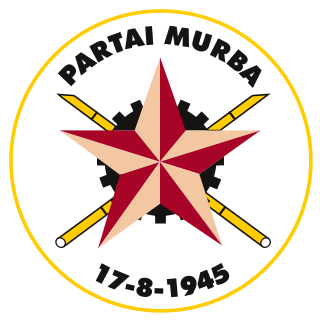
Murba Party was a 'national communist' political party in Indonesia. The party was founded by Tan Malaka, Chairul Saleh, Sukarni and Adam Malik in 1948. The history of the party was largely intertwined with that of the powerful Communist Party of Indonesia (PKI). Initially relations between PKI and the Murba Party were fluid, but gradually the two parties developed into each other's arch-enemies. The Murba Party continued to exist under the New Order, but was merged into the Indonesian Democratic Party in 1973.
The Association of Political Organisations of the Indonesian People was a federation of pre-war Indonesian political parties that was established to unite a range of organisations in the struggle for Indonesian independence.

Parindra was the name used by two Indonesian political parties.

The League of Supporters of Indonesian Independence was a right-wing nationalist political party in Indonesia established by former Army head General Abdul Haris Nasution as a vehicle for the Indonesian Army to enter the realm of politics. It was influential in persuading President Sukarno to introduce Guided Democracy in Indonesia and return to the 1945 Constitution.
The Indonesia Party, better known as Partindo, was a nationalist political party in Indonesia that existed before independence and was revived in 1957 as a leftist party.

Union of Islamic Education, also known as PERTI, is a Shafii-Ash'ari Islamic organization in Indonesia. The organization was founded by Sulaiman ar-Rasuli on May 5, 1928 in Candung, West Sumatra. In its development, PERTI had become a political party and gained four People's Representative Council (DPR-RI) seats and seven Constituent seats in 1955 general election.
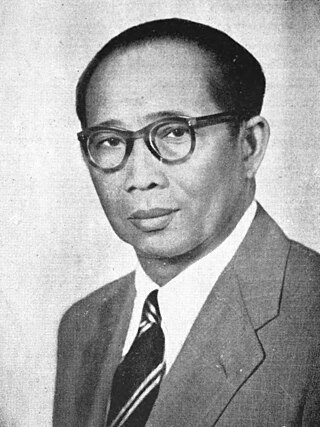
Sidik Djojosukarto was an Indonesian politician who served as chairman of the Indonesian National Party (PNI) from 1950 until his death. As PNI chairman, he was revered by all party factions, and was the closest to being an "authentic party hero."

Iskaq Tjokrohadisurjo was an Indonesian politician and advocate. A member of the Indonesian National Party, he served as Minister of Economic Affairs and Minister of Home Affairs during the 1950s. Hailing from Jombang Regency and being educated in law, he received higher education at Leiden University after a five-year career in various colonial courts. Iskaq was one of the earliest native Indonesian advocates during the Dutch colonial period, founding multiple law offices across the country. He also took part in the nationalist movement, being a co-founder of the Indonesian National Party and being arrested along with its other leaders in 1929.


















